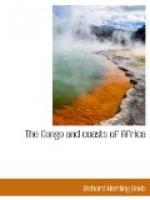Boma is the capital of a country which is as large as six nations of the European continent. For twenty-five years it has been the capital. Therefore, the reader already guesses that Boma has only one wharf, and at that wharf there is no custom-house, no warehouse, not even a canvas awning under which, during the six months of rainy season, one might seek shelter for himself and his baggage.
Our debarkation reminded me of a landing of filibusters. A wharf forty yards long led from the steamer to the bank. Down this marched the officers of the army, the clerks, the bookkeepers, and on the bank and in the street each dumped his boxes, his sword, his camp-bed, his full-dress helmet. It looked as though a huge eviction had taken place, as though a retreating army, having gained the river’s edge, were waiting for a transport. It was not as though to the government the coming of these gentlemen was a complete surprise; regularly every three weeks at that exact spot a like number disembark. But in years the State has not found it worth while to erect for them even an open zinc shed. The cargo invoiced to the State is given equal consideration.
“Prisoners of the State,” each wearing round his neck a steel ring from which a chain stretches to the ring of another “prisoner,” carried the cargo to the open street, where lay the luggage of the officers, and there dropped it. Mingled with steamer chairs, tin bathtubs, gun-cases, were great crates of sheet iron, green boxes of gin, bags of Teneriffe potatoes, boilers of an engine. Upon the scene the sun beat with vicious, cruel persistence. Those officers who had already served in the Congo dropped their belongings under the shadow of a solitary tree. Those who for the first time were seeing the capital of the country they had sworn to serve sank upon their boxes and, with dismay in their eyes, mopped their red and dripping brows.
[Illustration: “Prisoners” of the State in Chains at Matadi.]
Boma is built at the foot of a hill of red soil. It is a town of scattered buildings made of wood and sheet-iron plates, sent out in crates, and held together with screws. To Boma nature has been considerate. She has contributed many trees, two or three long avenues of palms, and in the many gardens caused flowers to blossom and flourish. In the report of the “Commission of Enquiry” which Leopold was forced to send out in 1904 to investigate the atrocities, and each member of which, for his four months’ work, received $20,000, Boma is described as possessing “the daintiness and chic of a European watering-place.”




